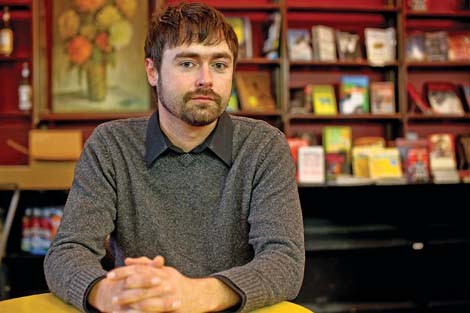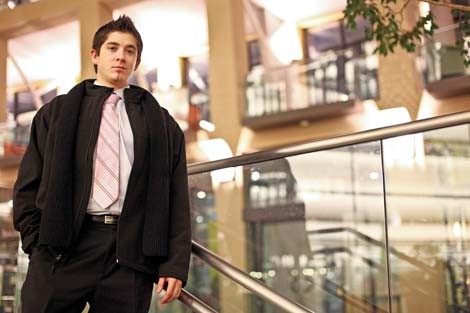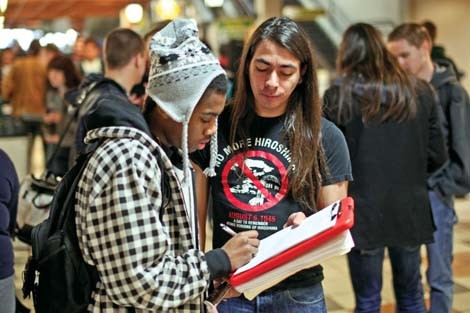Page 3 of 4

Peaceful Uprising
There’s nothing like shutting down a power plant together to break the ice and get to know your fellow rabble-rousers. “The group coagulated after the conference,” says Ashley Anderson of Peaceful Uprising, speaking of a November 2009 activist conference he attended where conference-goers, as a side trip, blocked the fire exits in a coal-fired power plant to shut it down for the day. It was the kind of getting-to-know-you act of civil disobedience that bonds protesters, taking them from merely “likeminded” to brothers and sisters in arms for a cause.
After the conference, Anderson and others formed Peaceful Uprising. The group has gained notoriety for endeavors such as sparking the 2010 Citizen’s Candidate initiative that held auditions to seek a liberal primary challenger to U.S. Rep. Jim Matheson, D-Utah.
While the Uprising will be a presence on the Hill—lobbying on behalf of climate issues, immigration and other progressive ideals—Anderson says the group avoids traditional meet-and-greets with legislators and seeks more unusual ways of influencing legislators.
In the 2010 session, Anderson and Peaceful Uprising cohorts staged a phony press release of a group advocating a Hitler-esque “final solution” to Utah’s LGBT population to satirize the issue. Similarly, in November, the group held a mock trial on behalf of climate activist Tim DeChristopher. The street-theater event gave organizers the chance to publicize the legal arguments DeChristopher says he has been denied making in federal court—namely, that his disruption of a 2008 oil lease auction in Salt Lake City was an act of self-defense rather than willful sabotage. Anderson hints that similar events will take place this session but, like a magician guarding his secrets, is not giving them away just yet. “There’s space on the climate and social-justice frontier for more creative and subversive [lobbying],” Anderson says. “We fill in that idea of it.”

For Sam Rangel with United for Social Justice, democracy is just about showing up. As a student, he went to the Capitol to hear Sen. Robles propose counter-legislation to Sandstrom’s enforcement-heavy immigration bill. Rangel showed up, met people and, within a matter of weeks, was an organizing member of United for Social Justice, whose imperative is to lobby on behalf of compassion in the immigration debate as well as to work to directly serve underrepresented communities. Though Rangel and USJ don’t support a state solution to the immigration issue, he knows legislators are hungry to make one and is grateful the issue is at least creating awareness.
“Personally, I’m thankful this issue has come out. Otherwise, people would still be living in the shadows,” Rangel says, adding that the call for a state solution is “pure political posturing.”
Rangel stands by the call for compassion and a federal solution to the immigration issue, counting friends in the undocumented community and having seen in business consultations how so-called get-tough enforcement actions have affected the local community. During his work, Rangel consulted with a warehouse that manufactured heaters and lost most of its workforce in an immigration sweep. “They’re really hurting now. They’ve got double the employees and half the productivity.”
Rangel feels that awareness about the issue will ultimately lend itself to educating the public about the greater burdens on taxpayers: politicians tied to special interests. “These are the same people who bankrupted our country by getting into bed with corporations and letting them run the country,” Rangel says. “People are going to realize that. It’s our biggest advantage.”
United for Social Justice works hard providing education to immigrant populations to let them know their rights by providing workshops on civil rights in community churches and doing outreach at public events like Mexican concerts.
The outreach may be more rewarding than challenging critics on the other side of the issue, but Rangel tries to see the bigger picture when debating people on immigration.
“Once you agree to disagree, you open the door to more dialogue,” Rangel says.

Sometimes, a jaunt to the other side of the world can help one appreciate that the best place to do good is back home. It worked for Batman in 2005’s Batman Begins, and it also worked for Greg Lucero when he took an excursion to Nepal in the summer of 2008 to visit Maoist guerrillas who had recently been ejected from the government.
“They said the best thing anyone could do for them was come make changes here” in the United States, Lucero says “because it’s American imperialism that threatens revolutions abroad.” While Lucero was heavily invested in documenting the Nepalese resistance against an authoritarian king, he also realized Utah County was ripe for its own insurgency.
In the fall of 2008, Lucero and “comrade” Chris Manor formed the Revolutionary Students Union at Utah Valley University, a club that mixes discussions of revolutionary history and theory and then applies those teachings to the real world. Beyond advocating progressive stances on issues like immigration, Lucero says the organization is primarily its own student union.
“We believe that education is an absolute right guaranteed to everyone,” Lucero says. “So we’re not only fighting budget cuts [to higher education] but fighting for expanded funding.” The group has been involved in a letter campaign to the Utah State Board of Regents advocating for more state funding for UVU, which they say currently receives the least amount of state funding for all state universities.
While RSU is not against lobbying, it prefers to focus on making noise versus polite lobbying.
“Insurgent politics isn’t about appealing to Republicans, Democrats or electoral parties in general,” Lucero says. “We prefer protest and direct confrontation. No matter how many calls these politicians get, they just don’t care, so we have to find other ways to put their feet to the fire.”
RSU is planning protests and rallies this legislative session designed to get lawmakers’ attention. But for Lucero, a softer approach is better with average Utahns,
“This sounds pretty banal, but a lot [of what we do] is conversation,” Lucero says. “We’re in Utah County, so there are a lot of conservative Mormon students who come to talk because maybe they’re uncomfortable about the war or immigration. They might say, ‘I see these immigrants as my brothers and sisters,’ and we tell them not only should you see them as your brothers and sisters, but you should do something about it.”